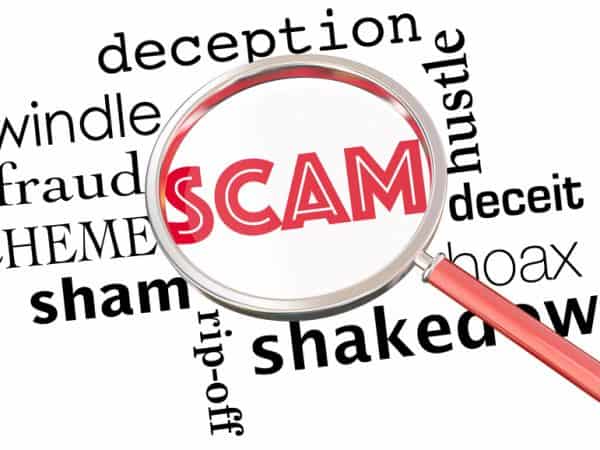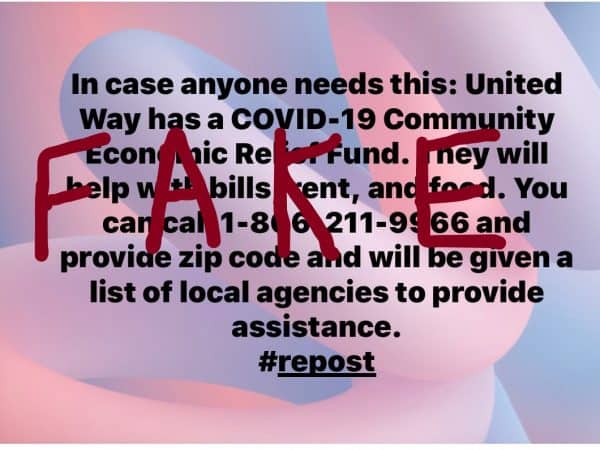When any crisis or natural disaster occurs, the scammers immediately come out of the woodwork. The current situation is no different.
There is bogus advice on Facebook, ads for products that claim (falsely) to detect, cure or treat coronavirus and even thieves going door-to-door claiming to be from the Centers for Disease Control. Already, scammers are trying to extra personal information and steal money by claiming to be working on stimulus checks.
It’s sad that, even in a national crisis, criminals and scammers work overtime trying to figure out ways to cheat us of our hand-earned money. It’s important to be vigilant and be skeptical of anyone trying to sell you anything or ask for your personal information, either online or on the telephone. We need to be extra-vigilant against bogus health claims, financial scams and online scams.
Here are some things to watch out for and ways to protect yourself, your wallet, your health and your personal information.
Health scams
There currently are no vaccines, tests, treatments or cures approved by the U.S. Food & Drug Administration. That means that any cure, test or treatment you see advertised is a scam.
“It’s likely that the products do not do what they claim, and the ingredients in them could cause adverse effects and could interact with, and potentially interfere with, essential medications,” the FDA said in an advisory to consumers.
Here are some tips from the FDA to identify false or misleading health claims.
Be suspicious of products that claim to treat a wide range of diseases.
Personal testimonials are no substitute for scientific evidence.
Few diseases or conditions can be treated quickly, so be suspicious of any therapy claimed as a “quick fix.”
If it seems too good to be true, it probably is.
“Miracle cures,” which claim scientific breakthroughs or contain secret ingredients, are likely a hoax.
Know that you can’t test yourself for coronavirus disease.
The Florida attorney general also reports that scammers are also sending emails that appear to come from the Centers for Disease Control and Prevention or World Health Organization. But, these malicious emails ask people to click on suspicious links or send sensitive information. The CDC and the World Health Organization (WHO) are not going to email you. Do not click on those links or provide information to people you don’t know.
In South Florida, law enforcement agents also warned against people dressed in white lab coats, knocking on doors and saying they are from the CDC and are offering free virus test kits. These are likely distraction robbers, who will rob your home while you are talking to one of them about the “test.” If you are approached like this, call 911.
The U. S. Department of Health and Human Services Office of Inspector General also reports a scam in which seniors are receiving phone calls offering them free virus test kits. The callers then ask for the senior’s Medicare number – which will be used in future frauds. Never, ever, provide personal information to someone who calls you out of the blue.
Financial scams
Congress has approved a $1,200 cash payment for most. The U.S. government is not going to text you to claim your payments. Yet, even before the legislation is passed, scammers were already texting people, asking them to claim their payments.
Do not click on links in messages sent by people you don’t know and do not provide personal information to people who call on the phone.
The Internal Revenue Service will NOT call you for your banking information. If you file your tax return electronically, you will receive your $1,200 via direct deposit. If you do not file electronically, you will receive a paper check, but it will take three or more weeks. The IRS will provide information here once it is available.
All the usual scams – bogus calls claiming to be from Social Security and law enforcement, calls and messages pretending to be from a grandchild who needs money – are still going on.
People in your community also are likely to collect money to help the needy during this time, and many of those efforts will be legitimate. But, before you give, made sure you verify that the money really will go to the beneficiaries.
Here is some information from the Federal Trade Commission on avoiding financial scams:
Hang up on robocalls. Don’t press any numbers. Scammers are using illegal robocalls to pitch everything from scam coronavirus treatments to work-at-home schemes. The recording might say that pressing a number will let you speak to a live operator or remove you from their call list, but it might lead to more robocalls, instead.
Know who you’re buying from. Online sellers may claim to have in-demand products, like cleaning, household, and health and medical supplies when, in fact, they don’t.
Don’t respond to texts and emails about checks from the government. The details are still being worked out. Anyone who tells you they can get you the money now is a scammer.
Don’t click on links from sources you don’t know. They could download viruses onto your computer or device.
Do your homework when it comes to donations, whether through charities or crowdfunding sites. Don’t let anyone rush you into making a donation. If someone wants donations in cash, by gift card, or by wiring money, don’t do it.
Don’t spread misinformation
Beware of information, appeals, compelling stories and other things you are asked to forward or repost on Facebook or via text. If it sounds too good to be true, it probably is. Before sharing information, make an attempt to verify it, starting with considering the source. Is it a publication you never heard of? Be suspicious.
A message saying people could get help from the United Way, for example, listed the phone number of one specific United Way office in Indiana, which helps people in its local area. You local United Way agency may be able to help, and in many areas, you can reach local help by dialing 2-1-1. The national United Way office put out info to try to correct the misinformation:
United Way Worldwide’s COVID-19 Community Response and Recovery Fund supports communities by helping local United Ways respond, and bolstering 211, the go-to information resource in times of crisis. Calls to 211 for help with basics have risen more than 300% in some areas, and are expected to top 27 million calls over the next six months. That’s more than twice the usual call volume that 211 fields in a typical year.
NOTE: You can dial 211 to speak to someone about local assistance at any time. The 1-866-211-9966 number you may have seen on social media is only available for residents of Indianapolis. Please be aware that financial assistance related to COVID-19 is not available for individuals everywhere.
You also cannot call a number and get a case of baby formula, nor can you avoid getting sick by frequently drinking warm water.




